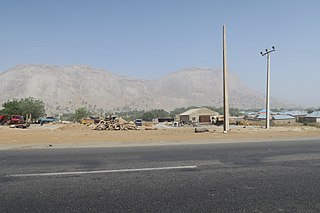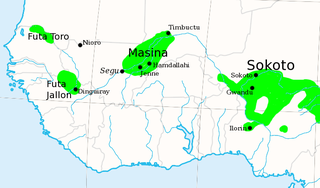Islamic history
Islam came to Bauchi from the Borno axis in the early part of the 14th century; however, it did not get solid root until the end of the seventeenth century through the Sokoto Caliphate. Yakubu the son of Dosa of the Gerawa tribe along with Bello of Zungur from the Bakal tribe of the Jarawa were given over to a Koranic teacher at Jetar, a village on the Dindima river bank in the middle of the 17th century to learn Arabic. As the Pagans began to put pressure on Islam all over Northern Nigeria, the teacher relocated to Sokoto where he handed over Yakubu and Bello to Othman Dan Fodio. It was there that Yakubu and Bello got in touch with Shehu of Gombe.
Having spent few Years under Dan Fodio, these students graduated and were sent to go and establish Islam in their various areas. A few years after their arrival, the revolt or the Jihad of DanFodio against the Chief of Gobir broke out and Yakubu and Bello rushed to Sokoto where they were given the flag to wage Jihad in Bauchi land. Shehu went to Sokoto while Elzakio concentrated in Katagum Azare area.
Bello used common brotherhood to acquire little cooperation of the Bakal people that lived from Jetar up to Zungur-Yamrat area while Yakubus people, the Gerawa remained pagans even after his death.
Using the Jahunawa that came along with him, Yakubu and bello ran over the Gwak people without much resistance. The Galadma with his regiment turned on the Duguri people and took the village of Ngigera, now Gigera, but were blocked by the Duguri warriors in an over night battle, and he was later killed at Twalang which resulted in the battle of twonglang. Many people were killed and the battle ended without a winner.
Colonial rule led to the Duguri people to opt for Pankshin Native Authority, until 1910 when they voluntarily returned to Bauchi Native Authority.
Islam was repelled at the Dass frontier at a battle called the Mbula battle which was fought at a place called Jakiri in Dott ward of Dass Local Government. Islam was able to gain entrance through Maleka the father of Bilyaminu Othman, the first Emir of Dass. At the Rauta Ningi axis, Islam did not suffer much except in the hands of the Warji and Miya people and so the emirate allowed them to remain submissive and practice their religion until the opening of the 19th century when most of them voluntarily joined Islam.
Usman Ɗan Fodiopronunciation was a Fulani scholar, Sunni Islamic religious teacher, revolutionary, and philosopher who founded the Sokoto Caliphate and ruled as its first caliph.

Sokoto is a major city located in extreme northwestern Nigeria, near the confluence of the Sokoto River and the Rima River. As of 2006 it has a population of over 427,760. Sokoto is the modern-day capital of Sokoto State and was previously the capital of the north-western states.

The Fulani War of 1804–1808, also known as the Fulani Jihad or Jihad of Usman dan Fodio, was a military conflict in present-day Nigeria and Cameroon. The war began when Usman Dan Fodiyo, a prominent Islamic scholar and teacher, was exiled from Gobir by King Yunfa, one of his former students.

The Sokoto Caliphate, also known as the Sultanate of Sokoto, was a Sunni Muslim caliphate in West Africa. It was founded by Usman dan Fodio in 1804 during the Fulani jihads after defeating the Hausa Kingdoms in the Fulani War. The boundaries of the caliphate are part of present-day Cameroon, Burkina Faso, Niger, and Nigeria. It was dissolved when the British and Germans conquered the area in 1903 and annexed it into the newly established Northern Nigeria Protectorate and Kamerun respectively.

Muhammadu Bellopronunciation was the second Sultan of Sokoto and reigned from 1817 until 1837. He was also an active writer of history, poetry, and Islamic studies. He was the son and primary aide to Usman dan Fodio, the founder of the Sokoto Caliphate and the first Sultan. During his reign, he encouraged the spread of Islam throughout the region, increasing education for both men and women, and the establishment of Islamic courts. He died on October 25, 1837, and was succeeded by his brother Abu Bakr Atiku and then his son, Aliyu Babba.
Sir Siddiq Abubakar III, GCON, GBE was a Nigerian Muslim leader. He served as the 17th Sultan of Sokoto between 17 June 1938 and 1 November 1988, making him the longest-reigning Sultan.

Bauchi is a city in northeast Nigeria, the Administrative center of Bauchi State, of the Bauchi Local Government Area within that State, and of the traditional Bauchi Emirate. It is located on the northern edge of the Jos Plateau, at an elevation of 616 m. The Local Government Area covers an area of 3,687 km2 and had a population of 493,810 in 2006.

Zamfara is a state in northwestern Nigeria. The capital of Zamfara state is Gusau and its current Governor is Bello Matawalle. Until 1996, the area was part of Sokoto State.

Northern Nigeria was an autonomous division within Nigeria, distinctly different from the southern part of the country, with independent customs, foreign relations and security structures. In 1962 it acquired the territory of the British Northern Cameroons, which voted to become a province within Northern Nigeria.
Adama ɓii Ardo Hassana, more commonly known as Modibbo Adama, was a Fulani scholar and holy warrior, who hailed from the Ba'en clan of Fulbe. He led a jihad into the region of Fombina, opening the region for Fulani colonisation.

Gobir was a city-state in what is now Nigeria. Founded by the Hausa in the 11th century, Gobir was one of the seven original kingdoms of Hausaland, and continued under Hausa rule for nearly 700 years. Its capital was the city of Alkalawa. In the early 19th century elements of the ruling dynasty fled north to what is today Niger from which a rival dynasty developed ruling as Sarkin Gobir at Tibiri. In 1975 a reunited traditional sultanate took up residence in Sabon Birni, Nigeria.

The Fulajihads sometimes called the Fulani revolution were a series of jihads that occurred across West Africa during the 18th and 19th centuries, led largely by the Muslim Fula people. The jihads and the jihad states came to an end with European colonization.

Nana Asmaʾupronunciation was a Fula princess, poet, teacher, and a daughter of the founder of the Sokoto Caliphate, Usman dan Fodio. She remains a revered figure in northern Nigeria. She is held up by some as an example of education and independence of women possible under Islam, and by others as a precursor to modern feminism in Africa.

Shehu al-Hajj Muhammad al-Amîn ibn Muhammad al-Kânemî (1776–1837) was an Islamic scholar, teacher, religious and political leader who advised and eventually supplanted the Sayfawa dynasty of the Kanem-Bornu Empire. In 1846, Al-Kanemi's son Umar I ibn Muhammad al-Amin became the sole ruler of Borno, an event which marked the end of the Sayfawa dynasty's eight hundred year rule. The current Shehu of Bornu, a traditional ruler whose seat remains in modern Borno State, Nigeria, is descended from Al-Kanemi.
Lere is a Local Government Area and town in Kaduna Kaduna State of Nigeria. Lere town is located geographically at the latitude 10 degrees 39 North and longitude 8 degrees 57 East. It is the headquarters of the Lere Emirate. The town and its environs has an estimated population of about 93,290 (2016). Lere Local Government has an area of 2,634 km2 and a population of 339,740 at the 2006 census. Its headquarters are in the town of Saminaka. The postal code of the area is 811.
The Bauchi Emirate was founded by Fula in the early 19th century in what is now Bauchi State, Nigeria, with its capital in Bauchi. The emirate came under British "protection" in the colonial era, and is now denoted a traditional state.
Ummarun Dallaje was the 39th Islamic Leader of Katsina, the first Fulani emir, as well as the patriarch of the Dallazawa dynasty. He became Amirul Muminin after the Jihad of Shehu Usman dan Fodiyo, succeeding Magajin Haladu, the last ruler of the centuries-old Habe dynasty, which founded by founded by Muhammadu Korau. Ummaru was succeeded by his son Saddiku.
The Torodbe; singular Torodo were Muslim clerics and theocratic monarchs who reigned in Futa Toro, a region located in the north of present-day Senegal, from the seventeenth to the early twentieth century.
Hausa literature is any work written in the Hausa language. It includes poetry, prose, songwriting, music, and drama. Hausa literature includes folk literature, much of which has been transcribed, and provides a means of recording, preserving, and transmitting knowledge, especially in regard to social, psychological, spiritual, or political roles.
The 2019 Bauchi State House of Assembly election was held on March 9, 2019 to elect members of the Bauchi State House of Assembly in Nigeria. All 31 seats were up for election in the Bauchi State House of Assembly.










